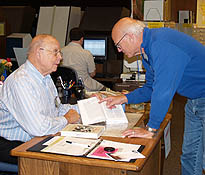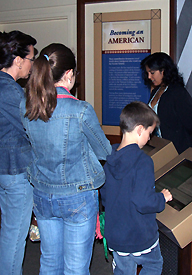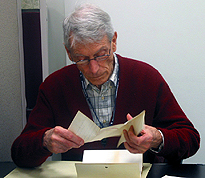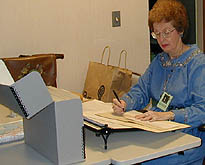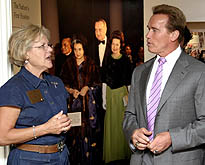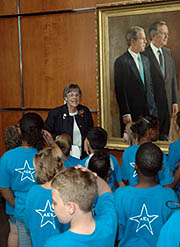
NARA's Armies of Volunteers
Winter 2006, Vol. 38, No. 4
By Lee Ann Potter and Rebecca Martin
A few years ago, a NARA staff member was presenting a session on NARA's education and volunteer programs for the agency's Modern Archives Institute, describing the various projects volunteers are engaged in, application and training requirements for volunteers, and a profile of NARA programs.
During the question-and-answer session that followed, one dismayed participant, a federal employee himself, expressed amazement at the size of our volunteer corps and the significant amount of time NARA volunteers generously donate each year to the agency.
Then he asked: "Do your volunteers know that you all are the federal government?"
Yes, the NARA staff member replied with delight.
NARA's volunteer program in Washington, D.C., began at the time of the nation's bicentennial, when a few docents were recruited and trained to provide information about the Charters of Freedom in the Rotunda. Since 1976, the size of the volunteer corps has grown significantly, and the types of projects the volunteers are engaged in have expanded.
Currently there are more than 150 active NARA volunteers in the Washington, D.C., area between the ages of 21 and 89 who, in the first nine months of fiscal year 2006, contributed 14,075 hours of their time to NARA. They spend their time as genealogy aides, docents, visitor service volunteers, and staff aides.
Volunteers also provide valuable services at NARA's 14 regional archives and 11 presidential libraries around the country, helping full-time staff greet and assist visitors, preserve and index records, and prepare for workshops and exhibits.
"I recall my own time researching at the National Archives and the help that volunteers provided. It made my work so much easier," said Archivist of the United States Allen Weinstein, a historian. "Now, I see them every day, assisting NARA staff in many roles—serving as docents in the Rotunda, preparing documents for microfilming, and putting researchers on the right research path."
"These volunteers add immeasurably to the services NARA provides to customers who come to learn America's story through the records in our holdings," Weinstein added. "We are fortunate and proud to have volunteers as part of the National Archives family."
Before becoming a volunteer at NARA in Washington, D.C., candidates are required to participate in 16 hours of orientation training. Once they are on board, they are asked to contribute 100 hours a year for a minimum of 2 years. These requirements do not seem to phase many of them—114 of our volunteers have been with us for at least 5 years, and 8 of them have given 20 or more years of service.
NARA volunteers tend to be enthusiastic, flexible, dependable, and interested in acquiring and sharing an appreciation for American history. They include scientists, teachers, members of the armed forces, homemakers, business persons, and others—even archivists (seven are former NARA employees).
"As a former teacher and one interested in family history research, I enjoy sharing my knowledge with our researchers and helping them solve their genealogical puzzles," said Liz Lourie, a volunteer since 1994.
Most are retired, but more than two dozen Washington, D.C., volunteers work full time elsewhere. And they come from a wide geographic area—Washington-area volunteers come from 83 different zip codes in Maryland, Virginia, and the District of Columbia.
"It's something different every time."
Volunteers frequently say that they relish the diversity of experiences they have volunteering at the National Archives. For genealogy aides, the variety comes in the different family stories that they learn as they help researchers investigate their ancestry. From the unusual (such as the person searching for an ancestor who had been part of a circus) to the typical request for help with ships' passenger lists, every research question provides a new little puzzle.
"You learn a lot," explained Virgina Dunkel, a genealogy aide for 10 years. Genealogy aides not only learn from assisting researchers and from their initial training program, they also work to keep up with all of the new information available through NARA's reference reports and on the Internet.
Docents, too, find new challenges each time they contribute time to the National Archives. These volunteer tour guides greet groups of all kinds with warmth and knowledge of their subject. Whether working with junior high school students, groups of families from around the country, members of professional organizations, or children visiting through the Make-a-Wish Foundation, docents bring records to life.
For thousands of visitors to the National Archives Building, docents are the face of NARA. To ready themselves for this position, docents spend more than 60 hours in training (in addition to their orientation hours). By the end of the course, they have learned about the agency's history, its organization, and its holdings. They have also completed hours of training in museum-based teaching techniques, studying and practicing how to help visitors understand primary sources and honing their communication skills.
"I volunteer to do something away from my home. It is a great way to meet nice people. I feel that I am doing some good," said Maria Flesher, a volunteer in Washington since 1995.
Taking two- or three-hour shifts in the Rotunda or the entrance lobby on the Constitution Avenue side of the National Archives Building, visitor service volunteers answer an array of questions every day.wledge of American history. I don't think that the paying jobs I've had have given me the same motivation to learn about a subject on my own time."
"It's like my own private game of Trivial Pursuit," laughed Laurel Schrock. Visitors ask questions ranging from "Where is the closest bathroom?" to "Was the ratification process of the Bill of Rights different from that of the Constitution?"
To prepare themselves for this daunting task, visitor services volunteers join docents for their training course—and do extensive reading on their own. Volunteer Lanka Karunaratne said, "The Archives has deepened my appreciation of and thirst for kno
"The records are fascinating."
From photographs taken during the Nixon administration to applications for bounty land after the War of 1812, to Freedmen's Bureau materials, volunteer staff aides work with many different records. Through their efforts, the agency makes headway on an endless list of potential projects.
Almost two-thirds of NARA's Washington-area volunteers work as staff aides, and their projects are wide-ranging. Some staff aides help create indexes and finding aids or develop folder lists. Many perform some kind of computerized data entry, and others help with holdings maintenance, boxing and labeling, preparing documents for microfilming, or writing transcriptions or translations for specialized and unique projects. Staff aides explain that they love having an opportunity to work with records.
"I was a history major and find it interesting to be able to work with primary sources," said Nancy Shapiro. Dick Beal was recruited to volunteer at the Archives by a friend. Dick explained that the lure was the records themselves: "I wanted to see those OSS records," referring to documents from the Office of Strategic Services, the World War II precursor to the Central Intelligence Agency.
"My work is important."
One particular staff aide project began more than a decade ago. Under the direction of archivist Cynthia Fox, members of the Civil War Conservation Corps (CWCC) flatten, fold, and assist in the general arrangement of records for microfilming. To date, they have worked with compiled service records, the Freedmen's Bureau records, and Civil War pension files.
Budge Weidman, the CWCC project manager (who volunteered more than 700 hours in fiscal year 2006!), explained: "I love the records, and I love knowing that the work we are doing will help make them last longer."
Her colleague Phyllis Altrogge added, "I enjoy thinking about future researchers. I like knowing that I am doing a favor for future generations."
Volunteers at libraries, regional archives
The Northeast and Pacific Alaska regional archives and the Johnson and Bush presidential libraries rely heavily on volunteers to provide a high level of service to customers.
"Volunteers are the heart and soul of the regional archives, and they remind us every day why we do what we do," said Susan Karren, director of the Pacific Alaska regional archives in Seattle, which has about 60 volunteers. "Public service is their goal, and they're always looking for ways to do more, for more people, and more efficiently."
Adds Priscilla Foley, Northeast regional archives director in Waltham, Massachusetts, which has 30 volunteers: "Our volunteer staff is vital to our operation. The presence of these dedicated individuals demonstrates to our researchers the commitment of our facility to the community and the region."
At regional archives, volunteers find themselves doing a wide variety of tasks to make researcher visits to NARA facilities easier. They include providing reference assistance, helping prepare for workshops, researching off-site reference requests, preparing guides for researchers, or writing description of records.
In both Waltham and Seattle, volunteers prepared indexes for Chinese Exclusion Act case files, which are a major source of genealogical information. In Waltham, they are indexing 19th-century bankruptcy documents from federal court files. In Seattle, they are indexing correspondence from some of the earliest settlers to Oregon Territory.
Volunteers also assist the many visitors who come to the presidential libraries and museums around the country.
"Volunteers bring to our institution years of life experiences and expertise, with careers ranging from foreign service, to teaching, to medicine, the business world, and to nuclear science," said Judy Davidson-Englert, volunteer coordinator at the Lyndon B. Johnson Library and Museum in Austin, Texas. The library has 110 volunteers.
At the Johnson Library and at the George Bush Library and Museum in College Station, Texas, volunteers help NARA staff handle the large numbers of visitors who come to learn about American history through by studying individual Presidents.
At the Johnson Library, volunteers assist in the audiovisual archives, help process personal papers collections, photograph items in the museum collection, and greet the tens of thousands of visitors who come to the library each year.
Last year at the Bush Library, many of the library's 200 volunteers pitched in and helped run photocopies when former President George H.W. Bush's presidential papers were opened and stayed around until the project was finished. Now they are assisting staff in a redesign project, in which 90,000 artifacts need to be cataloged.
"Our great volunteers make our museum patrons fell at home," said Patricia Burchfield, deputy director of the Bush Library. "They are our ambassadors to the public and to the students who come to learn about the presidency of George Bush. We could not operate our museum without these wonderful people. Volunteers are an essential part of who we are."
"I've made great friends."
Volunteers frequently explain that the records and the stories they tell, the intellectual stimulation, and the variety of experiences available to a NARA volunteer keep them coming back. But they are also emphatic when they declare that the friendships they have made with other volunteers and NARA staff members motivate them as well.
"I enjoy being here, keeping active, and being involved," said Win Skelton, a Washington volunteer since 1991.
"The social part" is what keeps her coming back to the Archives, Joanne Bayler explained. Connie Gass summed up the thoughts of many volunteers when she stated, "I always feel better when I leave."
Lee Ann Potter is the head of Education and Volunteer Programs, and Rebecca Martin is the volunteer coordinator at the National Archives and Records Administration in Washington, D.C.
